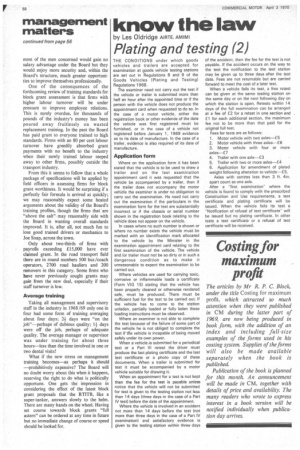know the law
Page 60

If you've noticed an error in this article please click here to report it so we can fix it.
by Les Oldridge A1RTE. AMIM1
Plating and testing (2)
THE CONDITIONS under which goods vehicles and trailers are accepted for examination at goods vehicle testing stations are set out in Regulations 8 and 9 of the Goods Vehicles (Plating and Testing) Regulations 1968.
The examiner need not carry out the test if the vehicle or trailer is submitted more than half an hour after the appointed time or if the person with the vehicle does not produce the appointment card when requested to do so. In the case of a motor vehicle, either the registration book or other evidende of the date the vehicle was first registered must be furnished, or in the case of a vehicle not registered before January 1, 1969 evidence as to its date of manufacture. In the case of a trailer, evidence is also required of its date of manufacture.
Application form
Where on the application form it has been stated that the vehicle is to be used to draw a trailer and on the last examination appointment card it was requested that the vehicle be accompanied by a trailer, then if the trailer does not accompany the motor vehicle the examiner is under no obligation to carry out the examination. He need not carry out the examination if the particulars in the examination form for the test are substantially incorrect or if the chassis or serial number shown in the registration book relating to the vehicle does not appear on the vehicle.
In cases where no such number is shown or where no number exists the vehicle must be marked with an identification mark allocated to the vehicle by the Minister in the examination appointment card relating to the first examination of the vehicle. The vehicle and /or trailer must not he so dirty or in such a dangerous condition as to make it unreasonable to expect the examination to be carried out.
Where vehicles are used for carrying toxic, corrosive or inflammable loads a .certificate Worm VIG 15) stating that the vehicle has been properly cleaned or otherwise rendered safe, must be produced. There must be sufficient fuel for the test to be carried out. If the vehicle has to come to the station unladen, partially loaded or fully laden these loading instructions must be observed.
Where an examiner is not able to complete the test because of the failure of some part of the vehicle he is not obliged to complete the test if die vehicle is incapable of being moved safely under its own power.
When a vehicle .is submitted for a periodical test or a Part III retest the driver must produce the last plating certificate and the last test certificate or a photo copy of these documents. When a trailer is submitted for test it must be accompanied by a motor vehicle suitable for drawing it: When an appointment for a test is not kept then the fee for the test is payable unless notice that the vehicle will not be submitted for test is given to the testing station not less than 14 days (three days in the case of a .Part IV test) before the date of the appointment.
Where the vehicle is involved in an accident not more than 14 days before the test (not more than three days in the case of a Part IV examination) and satisfactory evidence is given to the testing station within three days of the accident, then the fee for the test is not payable. If the .accident occurs on the way to the test the notification to the test station may be given up to three days after the test date. Fees are not returnable but are carried forward to meet the cost of a later test.
When a vehicle fails its test, a free retest can be given at the same testing station on the same day or on the next following day on which the station is open. Retests within 14 days of the full examination can be arranged at a fee of £2 for a retest in one section and £1 for each additional section, the maximum fee not to be more than that paid for the original full test.
Fees for tests are as follows: 1. Motor vehicle with two axles—ES 2. Motor vehicle with three axles—£6 3. Motor vehicle with four or more axles—£7 4. Trailer with one axle—£3 5. Trailer with two or more axles—E4 6. Application for amendment of plated weight following alteration to vehicle £5. Axles with centres less than 3 ft. 4in. apart count as one axle.
After a "first examination" where the vehicle is found to comply with the prescribed Construction and Use requirements, a test certificate and plating certificate will be issued. When the vehicle fails its test a "Notification of refusal of test certificate" will be issued but no plating certificate. In other tests a test certificate or a refusal of test certificate will be received.








































































































